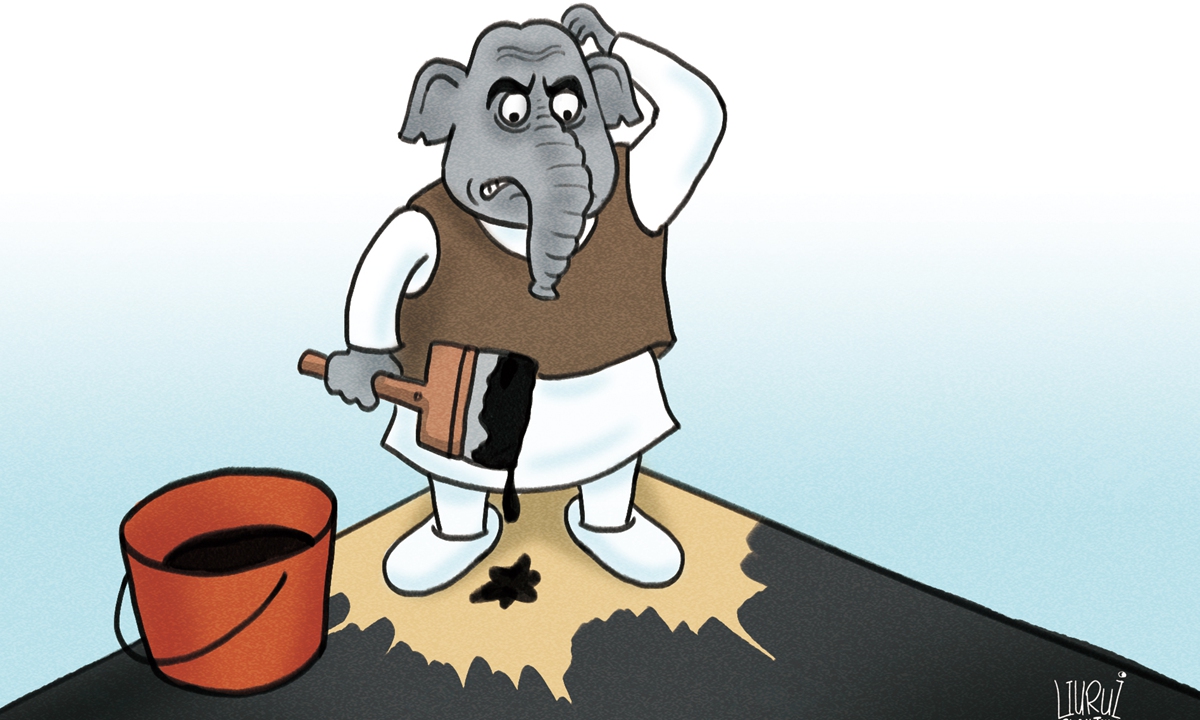Does international community favor India in its conflict with China?
By Long Xingchun Source: Global Times Published: 2020/9/10 10:41:19

Illustration: Liu Rui/GT
Since the China-India border clash in the Galwan Valley in June, India has frequently acted against China. India lags behind China in economic and military power, but why is it still taking a risk to provoke China?
One important reason is India firmly believes that China is unwilling to launch a war, or take the initiative to escalate a war. Thus, India mainly engages in small-scale provocations on the border. It believes that China's great military strength cannot play out in such small frictions.
Being kidnapped by extreme nationalism, the Narendra Modi administration and Indian army must show their tough position against China. They have to be tough, whether they really have the strength or not. New Delhi seems to be sure that China will not engage in a large-scale military clash, so it dares to brag about its determination.
India is putting on a posture of launching a war. But by making such a posture, India's gains do not make up for losses because military mobilization requires great resources. For India, its heavy burden may become unbearable in the long run. Thus, India's recent provocations may be a sign that it can no longer bear such a burden. New Delhi is seeking a preferential deal with Beijing as soon as possible.
China-India relations have deteriorated rapidly. In China-US relations, the US is stronger and provocative side. But in China-India relations, it is India - the weaker side - that has been provoking. This is a very interesting phenomenon.
In addition to shifting domestic attention from the economic downslide and epidemic, another important reason behind worsening China-India relations is New Delhi's misjudgment of the overall situation. China-US relations are tense, and the situation was similar in 1962. India wrongly believes that it is facing an opportunity. It believes that China may not have time to deal with India's provocation since Beijing is now focused on dealing with Washington. India has the illusion that China will make big concessions to it.
India believes its international environment is optimistic. During the 1962 China-India war, China's relations with the Soviet Union were in a bad situation. Back then, New Delhi believed it had won the sympathy and support of the Soviet Union. Now India believes it is enjoying good relations with Russia. Indian Defense Minister Rajnath Singh said in June that India-Russia relations are one of a "special and privileged strategic partnership."
The current international environment has changed profoundly, but India is still immersed in its outdated strategic mindset. In fact, there are many shared opportunities for China, Russia and India, including their cooperation under the framework of BRICS and the Shanghai Cooperation Organization. It is impossible for Russia to support India's provocation against China. Although Russia sells arms to India, it is regular sales. Russia still hopes China and India can peacefully resolve their disputes, and New Delhi has no reason to be optimistic.
The US is regarded as India's major supporter. Indeed, the US has been promoting its Indo-Pacific Strategy to win over India, which makes New Delhi believe it is holding more bargaining chips against Beijing.
But is Washington really trustworthy? The Trump administration claims to support India, but just look at what it has done: In 2019, the US and India engaged in tit-for-tat tariff actions; Washington also planned to restrict H-1B visas issued each year to Indians; the US also sells weapons to India at high prices. If the current US administration wants to make friends, it seeks to benefit from its friends. It seems India is still not aware of this.
If military conflicts break out between China and India, the US may provide India with some intelligence support and sell it weapons. But it is impossible for the US to send troops to help India. That is to say, even with US support, India will never gain a military advantage in a confrontation against China.
Indian troops outrageously fired warning shots at Chinese border patrol soldiers on Monday, and tensions have escalated rapidly. But even if a border war breaks out, China will never make concessions on the border issue. The only result is the two sides will end up with casualties, property losses and further confrontation. What is the point of fighting such a war?
If India becomes intolerably provocative, then China may as well put other disputes aside and focus on dealing with India. If India acts most proactively in confronting China, it may be beaten up. India should be wiser and stop helping the US provoke China. After all, China may not fight with the US, but with India - a cannon fodder at the forefront.
The author is a senior research fellow of the Academy of Regional and Global Governance at the Beijing Foreign Studies University and president of the Chengdu Institute of World Affairs. opinion@globaltimes.com.cn
Posted in: ASIAN REVIEW,CHINA-INDIA